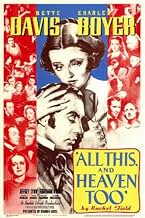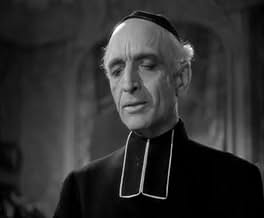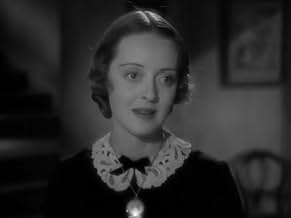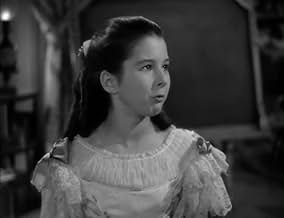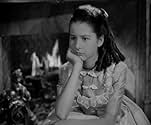A duchess's irrational behavior toward her children's governess triggers tragic events that will change her family's lives forever.A duchess's irrational behavior toward her children's governess triggers tragic events that will change her family's lives forever.A duchess's irrational behavior toward her children's governess triggers tragic events that will change her family's lives forever.
- Nominated for 3 Oscars
- 3 nominations total
- Berthe de Praslin
- (as Ann Todd)
- Director
- Writers
- All cast & crew
- Production, box office & more at IMDbPro
Storyline
Did you know
- TriviaJune Lockhart's first credited role (and second film). In addition, out of the four children starring in the movie, she was the only one to continue acting into adulthood.
- GoofsThe Duchess of Praslin is seen licking envelopes in which she has placed letters to her husband, the Duc de Praslin. This film is set in the 1840s; gummed envelopes would not be invented for another 100 years. Correspondence in the 1840s would not be placed in a #10 business envelope either, as seen in the film. The letters would be placed in another sheet of paper and then sealed over with a wax seal or simply folded over and sealed with a wax seal, and sometimes a ribbon would be set in the wax as well.
- Quotes
Duc de Praslin: Why are you smiling? May I share whatever pleases you so?
Henriette Deluzy-Desportes: You will think I am very silly, I'm afraid, but standing here like this with the snow falling reminds of something I used to know. Do you remember a little round glass globe that...
Duc de Praslin: Oh yes, I know, with a snow scene inside. We had a paperweight on a desk at home like that. You shook it and the snow whirled around out from nowhere in a blinding storm.
Henriette Deluzy-Desportes: Yes, that's exactly what I mean.
Duc de Praslin: And if you looked closely enough the whole world seemed to be obliberated and shut out.
- SoundtracksThe War of the Roses
(uncredited)
Music by M.K. Jerome
Lyrics by Jack Scholl
Played on a spinet by Bette Davis
Sung by Ann E. Todd, Virginia Weidler and June Lockhart
Its best features include:
Bette Davis' performance. Before this I knew she was a spectacular entertainer; now I know she can act. She is subtle and yet tremendously powerful. Her eyes, her dignified intelligence, and her self-restraint speak volumes. No camp here, just the telegraphing of quiet power.
Charles Boyer. Boyer was a man of substance; he served his country in World Wars I and II, studied philosophy at the Sorbonne, and stayed married to the same woman for over forty years. Again, as with Davis, he is restrained, as the narrative demands, but his substance telegraphs out of his body, his forced, tragic smiles, his stiff mien suddenly breaking into fitful efforts at frivolity, the quiet endurance with which he, at first, suffers his hated wife.
Barbara O'Neil is unforgettable as the Duchess de Praslin. O'Neil was the model of noble womanhood as Scarlett O'hara's mother; here she casts her decorum aside, after, first, shredding it to bits. I think I'll never be able to watch her in GWTW again without cracking up. Every Gothic Romance, including this one, requires a Hoyden - Rochester's mad wife, "Rebecca's" Mrs. Danvers. O'Neil chews them all to bits and spits them out. Even her false eyelashes appear as weapons, able to eviscerate her husband and her hated governess.
The supporting cast is no less superb. June Lockhart is a believably loving daughter; Harry Davenport, utterly un-French, is a wonderful, prophetic Pierre who warns Bette Davis and the viewer that when they enter the house of the Duke and Duchess, they enter Hell, and all hope should be abandoned.
Even the nasty girl who taunts Bette Davis at the opening of the film could not have been better cast.
Though black and white, the film reveals its high production values; it is rich and varied and offers the eye a sumptuous feast of fabrics, surfaces, and shadows. You won't miss color here at all.
I am torn about the plot, trying to decide if the movie wanted to make me, the viewer, experience the Duke as a weak man who allowed Mlle D, Bette Davis, to be exposed to so much social and emotional danger. I'd welcome others' thoughts on this question. In his apparent weakness, the Duke reminded me of the Paul Henreid, "Jerry" character in "Now Voyager," another married man who loved, and failed, a Bette Davis character.
- Danusha_Goska
- Aug 8, 2003
- Permalink
- How long is All This, and Heaven Too?Powered by Alexa
Details
Box office
- Budget
- $1,370,000 (estimated)
- Runtime2 hours 21 minutes
- Color
- Aspect ratio
- 1.37 : 1
Contribute to this page



